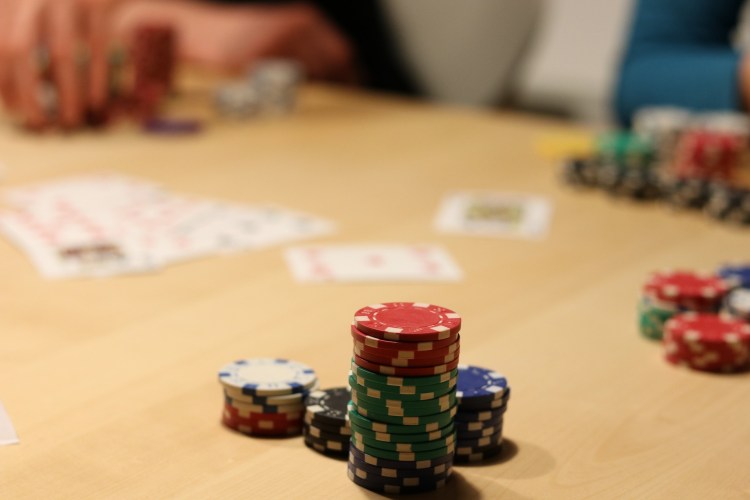“How many times have you heard this? “I can’t win in those small games.” I don’t know about you, but that’s the game I dream of.” Michael Wiesenberg tells it like it is.
Can’t Get Them Out – Thoughts on playing small games

Can’t Get Them Out
by Michael Wiesenberg © 2019 Great Bridge Links
How many times have you heard this? “I can’t win in those small games. They don’t know the value of a hand. You can’t get them out of a hand. You can’t represent a hand. They stay right to the end and draw out on you every time.”
I don’t know about you, but that’s the game I dream of. I don’t care whether it’s hold’em, stud, lowball, you name it. I want to play in a game where every round is capped and the players all stay to the bitter end every hand.
Yeah, I’ll get drawn out on a lot, but so what? The pots I win will be huge, and make up for the ones I lose.
“There’s no skill in that kind of game”
You’ll hear the same players say this. “It’s just a crap shoot.” Not really. It’s a game of skill, just as at the higher limits. It’s just a different kind of skill. Much easier to play. You just play good cards, better than those the other players stay in on. You don’t get to bluff a lot, that’s all. In fact, you may not get to bluff all night. So what? Who wants to get them out when you have the best hand?
Why do some players hate this kind of game? Because they have no flexibility. They are used to a certain kind of game, in which their style of play wins. In this kind of game, the purpose of a raise is often to thin the field. They know how to play hands that do best against one or two others, but don’t understand positive expectations. Yes, if you start with pocket aces in hold’em, and narrow the opposition to two players, you’ll win more than half the pots. But if you keep raising and it’s capped, and you’re playing against six or seven opponents who will stay till the end, you’ll lose two-thirds of the hands. (Against six random opponents who always stay till the last card, which is what some analysts assume in their calculations, you win about 43%. But let’s assume that only the best six of your nine opponents’ hands play and that some of the totally hopeless hands fold before the river. With those strictures, you might be unlucky enough to win only about a third of the hands.) In a $3-$6 game, every round capped, you put in $72. On the average, then, three times this time this situation comes up, you lose twice, or $144. One time out of three you win $432. Net win for the three times is $288, an average win of $96 each time you get aces.
This is a bit extreme, of course. You won’t have six players stay to the end every time, nor will it be with random hands. They’ll be in there on something, even if it’s inferior to your aces. So maybe you win one time out of four. As long as each time you win your payoff is better than 3-to-1, you have a positive expectation. They don’t seem to understand this, these players who swear, “The next time I get pocket aces, I’m just going to throw them away. I never win on them.” Right. (Have you ever actually seen one of these players throw away pocket aces before the flop?)
How about seven-card stud?
You start with three kings. Low card bets first on this round, and that is a deuce. Four players in the pot before you. You raise. The dealer comes in cold, and the others all call. On fourth street the deuce shows a pair of deuces. Two of the remaining players show two cards to a flush, and the others have miscellaneous cards, none of which is a pair. The deuces bet, and, since a pair is showing, that bet is a double bet. You raise on the strength of your three kings, one of the potential flushes raises again, and the round manages again to get capped. By the time it gets to sixth street, the deuces have become 2-2-A-4, both of the potential flushes have three to their flush, and the others have pairs showing. You still have two kings in the hole and K-3-4-5 on the board. Comes the river card and you have not managed to catch another king or pair one of your other cards.
On the showdown, the two potential flushes disgustedly throw away their hands and mutter something about having missed the last 19 flush draws. Of the miscellaneous pairs, one has made a set. The holder of the pair of deuces shows that he caught a 3 on the river to make an inside straight. The deuces were behind all the way until the river.
Does this mean you can’t beat the loose low-limit stud game in which the players stay on anything that has the slightest chance, even when they’re clearly beat? Not at all; it just means you have to adjust your play. You don’t play many speculative hands without money odds, and you’re selective about pairs. Your big hands will get drawn out on a lot more often than in a higher-limit game. You’ll have the best of it all the way and lose to the guy who stayed all the way on a possible inside straight. But just like in hold’em, start with better cards than the other players, and throw them away when you don’t improve, and you’ll win.
Can’t get them out? Big deal. Don’t try.








